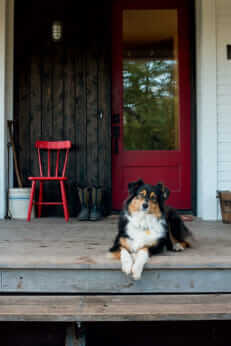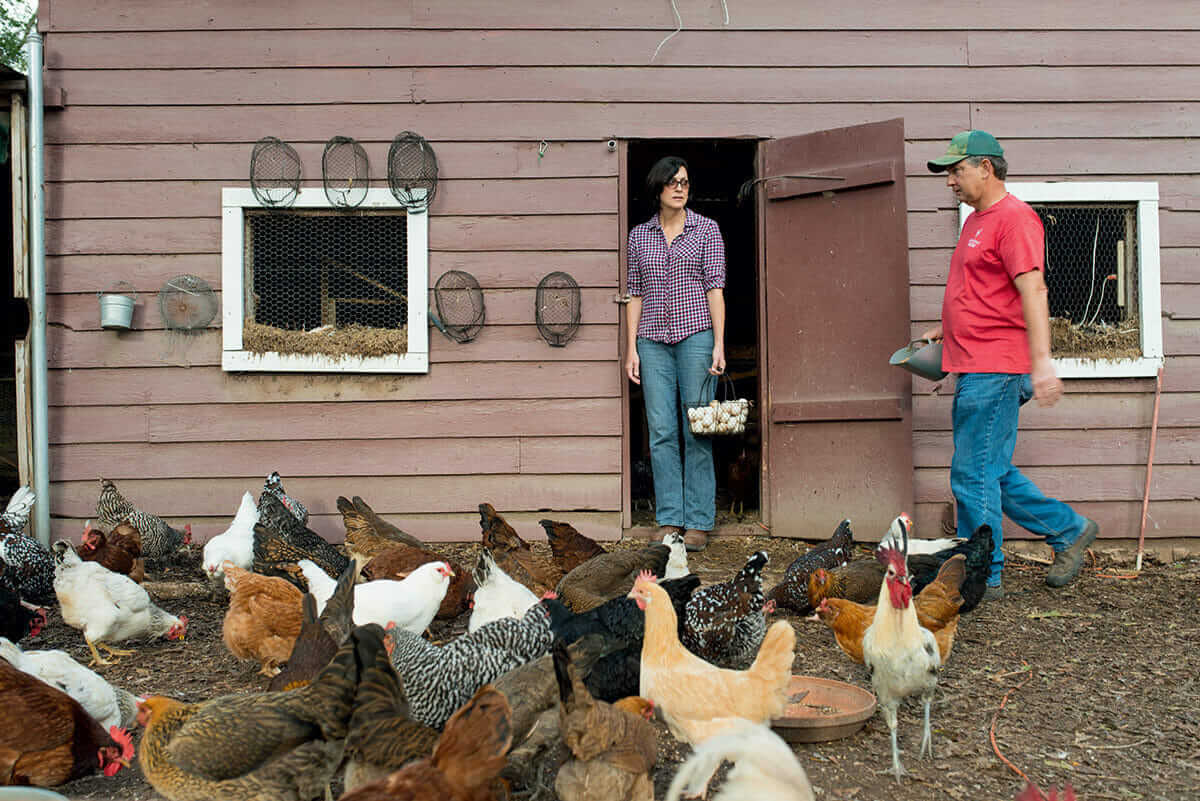Two Empty Nesters Hatch a Plan in East Austin, Texas
After packing their kids off to college, a couple turned a derelict patch of earth in East Austin into a flourishing urban farm.
Officially, Paula and Glenn Foore’s Springdale Farm welcomes visitors on Wednesdays and Saturdays only. But it’s not unusual for the duo to look up from Sunday brunch to discover strangers wandering amid the tomato plants or ogling the chickens. “Our daughters joke that we live in a state park,” says Glenn.
Hardly. Springdale borders an industrial strip in East Austin, Texas, clogged with warehouses and power lines, where the verdant five-acre spread attracts curious passersby, as well as a number of noted chefs. “To have a farm right in the city is huge,” says Todd Duplechan of Lenoir restaurant. “You’ve got the freshest ingredients a 10-minute drive from downtown.” Though the Foores purchased the property a quarter-century ago, they admit to ignoring its potential for over a decade. Then, the 2008 recession hit their landscaping firm hard. Suddenly, what had been a place to park lawn equipment and extra plants signified an untapped income opportunity. Glenn and Paula redirected the firm’s crew toward planting vegetables on the East Austin plot, while the couple continued raising three girls in leafy North Austin. Recalls Paula, “We kept putting in beds until it was wall-to-wall produce, everything from mizuna to okra.” She and Glenn also invested in approximately 25 laying ducks and 100 heritage hens and opened a farmstand out front.
Two nights a week, Chef Sonya Cote stages a supper club at Springdale Farm, using ingredients picked on-site. “If it weren’t for these events, we’d be sunk,” admits Paula Foore.
By 2010, the two had decided to go all in, relocating their whole lives to Springdale. “Our youngest daughter was headed off to college,” Paula explains. “The neighborhood was improving, and we were tired of commuting.” They enlisted architect Eric Rauser, who helped envision a rustic-modern, two-story home with a peaked roof, generous porch, and reclaimed-wood floors. “It’s more Midwestern farmhouse than Texas ranch,” notes Glenn, 60, an Ohio native. “It just felt right.”
Ditto his newfound career. “I wouldn’t call farming a passion so much as an obsession,” he says. “It’s full-time as hell, and we love it.” An instant jackpot, however, the venture was not. To make ends meet, the Foores started hosting weddings and other parties at least once a month. Two nights every week, Sonya Coté, chef-owner of Austin’s beloved Hillside Farmacy, stages an on-site supper club at Springdale, called Eden East, devising five-course menus – which might include squash blossoms with Texas blue crab, or grilled sirloin with fresh peas and arugula pesto – that incorporate ingredients picked steps away. “If it weren’t for these events, we’d be sunk,” admits Paula, 57.
A few years back, she and Glenn came dangerously close to that fate. As Austin boomed, the city began debating the rights of urban farms to serve as social venues, putting Springdale’s very lifeblood in peril. “We were ready to quit,” remembers Glenn. “And that’s when our clients said, ‘No way, we’re dragging your ass across the finish line.’” Chefs like Duplechan, Coté, Michael Fojtasek of Olamaie, and David Bull of Second Bar & Kitchen agitated on the Foores’ behalf. Homemade signs of support popped up in windows all over town, and #WeAreSpringdale trended briefly on Twitter. The city council ruled to allow the farm to continue as an event site, effectively saving Springdale, in 2015.
“We haven’t invented anything new. We’re just planting seeds and not spraying chemicals on them.”
Even after a decade with their hands in the dirt, Glenn and Paula still face an agricultural learning curve, thanks to Austin’s fickle weather. The intense summer heat can render zucchini impossible to cultivate, and an unexpected hailstorm might wipe out a tomato crop. “We had to discover the hard way that, one year your beets will come up in the middle of October, and the next, not make an appearance until January,” says Paula.
Nevertheless, the Foores continue to experiment with unusual vegetables, such as edible Asian loofah gourds and ‘Rattlesnake’ pole beans, courtesy of a $7,500 grant for trialing heirlooms from the Austin Food & Wine Alliance. Such risks delight the city’s restaurateurs. “I spend a lot of time with Paula and Glenn in the field, saying, ‘What do you think about growing some Cajun peppers?’” reports Lenoir’s Duplechan. (His most oddball request: bark from their pecan trees to craft cocktail bitters.)

Some of the folks who show up at Springdale on Sundays, Mondays, Tuesdays, Thursdays, and Fridays aim to glean kitchen-gardening tips. A few are eager to discuss the politics surrounding organic agriculture. “We haven’t invented anything new,” insists Glenn. “We’re just planting seeds and not spraying chemicals on them.” He and Paula opted out of the official certification process, since each of their roughly 75 crops would require a separate paper trail. “Our customers know how we farm and that our methods are beyond organic – whether we’ve written a check to the USDA or not,” explains Paula. Instead, she and Glenn focused on founding a nonprofit organization, the Springdale Center for Urban Agriculture, to develop educational programs for local kindergarten through high-school students.
Two winters ago, the Foores vowed to do something that once seemed unthinkable: take a vacation. For their first trip together in eight years, Glenn and Paula headed to Cabo San Lucas, Mexico. Not that this husband and wife spent the week sipping umbrella drinks by the pool. “We made a point of visiting all these little organic farms down there, to check out what they were doing,” says Glenn. “That’s our kind of escape.”
Follow us

This work is licensed under a Creative Commons Attribution-NoDerivatives 4.0 International License.
Want to republish a Modern Farmer story?
We are happy for Modern Farmer stories to be shared, and encourage you to republish our articles for your audience. When doing so, we ask that you follow these guidelines:
Please credit us and our writers
For the author byline, please use “Author Name, Modern Farmer.” At the top of our stories, if on the web, please include this text and link: “This story was originally published by Modern Farmer.”
Please make sure to include a link back to either our home page or the article URL.
At the bottom of the story, please include the following text:
“Modern Farmer is a nonprofit initiative dedicated to raising awareness and catalyzing action at the intersection of food, agriculture, and society. Read more at <link>Modern Farmer</link>.”
Use our widget
We’d like to be able to track our stories, so we ask that if you republish our content, you do so using our widget (located on the left hand side of the article). The HTML code has a built-in tracker that tells us the data and domain where the story was published, as well as view counts.
Check the image requirements
It’s your responsibility to confirm you're licensed to republish images in our articles. Some images, such as those from commercial providers, don't allow their images to be republished without permission or payment. Copyright terms are generally listed in the image caption and attribution. You are welcome to omit our images or substitute with your own. Charts and interactive graphics follow the same rules.
Don’t change too much. Or, ask us first.
Articles must be republished in their entirety. It’s okay to change references to time (“today” to “yesterday”) or location (“Iowa City, IA” to “here”). But please keep everything else the same.
If you feel strongly that a more material edit needs to be made, get in touch with us at [email protected]. We’re happy to discuss it with the original author, but we must have prior approval for changes before publication.
Special cases
Extracts. You may run the first few lines or paragraphs of the article and then say: “Read the full article at Modern Farmer” with a link back to the original article.
Quotes. You may quote authors provided you include a link back to the article URL.
Translations. These require writer approval. To inquire about translation of a Modern Farmer article, contact us at [email protected]
Signed consent / copyright release forms. These are not required, provided you are following these guidelines.
Print. Articles can be republished in print under these same rules, with the exception that you do not need to include the links.
Tag us
When sharing the story on social media, please tag us using the following: - Twitter (@ModFarm) - Facebook (@ModernFarmerMedia) - Instagram (@modfarm)
Use our content respectfully
Modern Farmer is a nonprofit and as such we share our content for free and in good faith in order to reach new audiences. Respectfully,
No selling ads against our stories. It’s okay to put our stories on pages with ads.
Don’t republish our material wholesale, or automatically; you need to select stories to be republished individually.
You have no rights to sell, license, syndicate, or otherwise represent yourself as the authorized owner of our material to any third parties. This means that you cannot actively publish or submit our work for syndication to third party platforms or apps like Apple News or Google News. We understand that publishers cannot fully control when certain third parties automatically summarize or crawl content from publishers’ own sites.
Keep in touch
We want to hear from you if you love Modern Farmer content, have a collaboration idea, or anything else to share. As a nonprofit outlet, we work in service of our community and are always open to comments, feedback, and ideas. Contact us at [email protected].by Miranda Crowell, Modern Farmer
August 15, 2018
Modern Farmer Weekly
Solutions Hub
Innovations, ideas and inspiration. Actionable solutions for a resilient food system.
ExploreExplore other topics
Share With Us
We want to hear from Modern Farmer readers who have thoughtful commentary, actionable solutions, or helpful ideas to share.
SubmitNecessary cookies are absolutely essential for the website to function properly. This category only includes cookies that ensures basic functionalities and security features of the website. These cookies do not store any personal information.
Any cookies that may not be particularly necessary for the website to function and are used specifically to collect user personal data via analytics, ads, other embedded contents are termed as non-necessary cookies.
